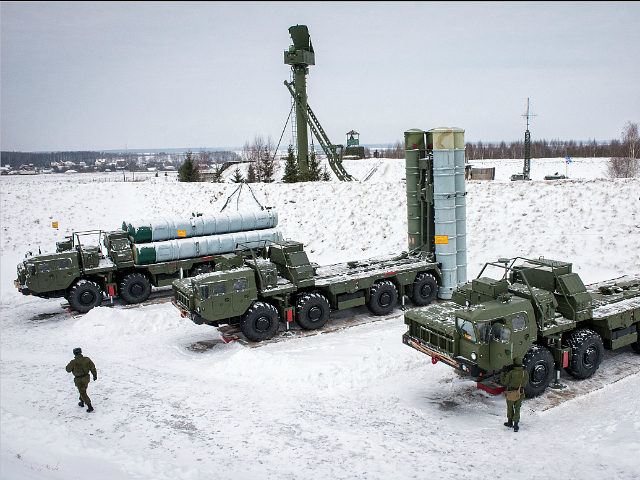Russia responded to the arrival of 3,000 U.S. troops in Poland by deploying advanced S-400 anti-aircraft missiles around Moscow.
The UK Daily Mail quotes the Russian Defense Ministry as saying:
The SAM combat squads of the Moscow Region aerospace forces have put the new S-400 Triumph air defense missile system into service, and have gone on combat duty for the air defense of Moscow and the central industrial region of Russia. The main task of the anti-aircraft missile troops of the Russian Aerospace Forces is air defense and protecting vital state, military, industry and energy facilities, as well as the Armed Forces troops and transport communications, from aerospace attacks.
According to International Business Times, the Defense Ministry plans to deploy four more units equipped with S-400 launchers later this year.
The UK Independent reports that the first deployment will take up positions in Podolsk, 15 miles south of Moscow. The Russians announced that S-400s would be deployed to Kaliningrad, near the Polish and Lithuanian borders, in November — a position that would give them the ability to target NATO aircraft over most of the Baltic region.
The Independent observes that Russian officials gave no indication of which “enemy” they expected to launch airstrikes on vital infrastructure around Moscow.
On Friday, Chinese government media reported that China and Russia are working together on “countermeasures” to the THAAD anti-missile system the United States is deploying in South Korea, to defend against North Korean threats.
“China and Russia urged the United States and South Korea to address their security concerns and stop the deployment of THAAD on the Korean Peninsula,” read a joint statement quoted by Reuters.
Chinese Foreign Ministry spokesman Lu Kang said on Friday:
We think the US-South Korean decision to deploy the THAAD missile defense system has seriously threatened China’s security interest. For the region, it will also break the strategic balance. So it’s completely understandable to see countries in the region firmly oppose this decision. China and other countries have to address our own legitimate security concerns and take necessary measures to safeguard our security interest.
The Chinese and Russians conducted a joint anti-missile drill in May and are planning another for 2017. The point of expressing their anxiety over an anti-missile system with anti-missile drills is that China and Russia frequently accuse the U.S. and Europeans of plotting to launch aggressive strikes from behind their missile shields.
Also, Reuters notes the Chinese and Russians have expressed concerns about the powerful radar of the THAAD system compromising their security.
CNN cites analysts who say the Chinese foreign policy establishment sees THAAD as a threat to the region on par with North Korea’s nuclear ambitions. In essence, the Chinese and Russians worry that the U.S. is building an anti-missile and anti-aircraft fence around them.

COMMENTS
Please let us know if you're having issues with commenting.